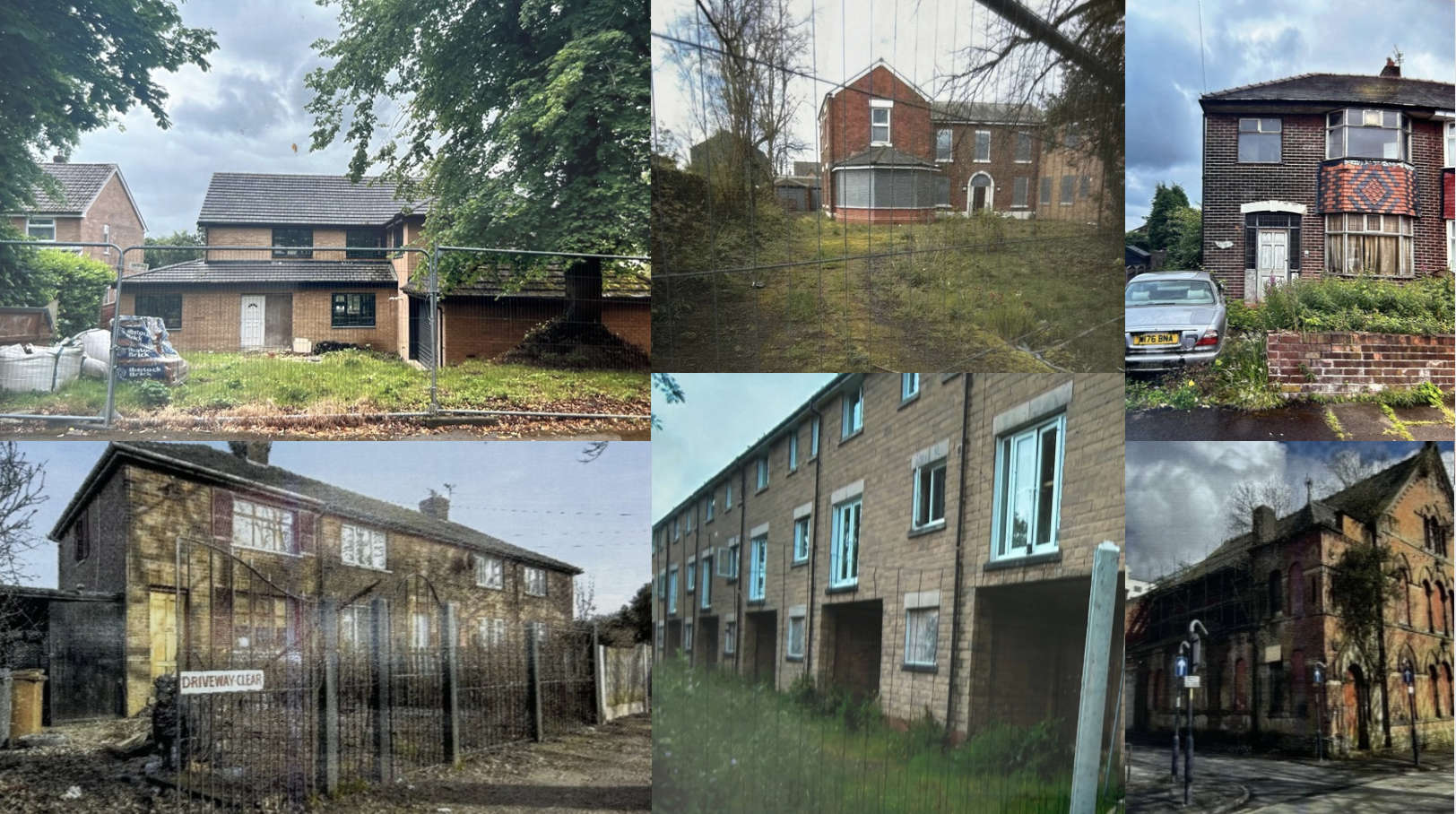
More than 600 properties in Tameside have been found to be empty over the past ten months, a survey has said, stoking concerns the borough is not doing enough to alleviate pressure on local housing services.
The figures come as over 700,000 homes remain empty across the UK, according to the most recent government figures, with 264,884 being empty for over six months.
The independent survey was carried out by retired estate agent Stephen Gooderson, who has been surveying properties in the area for more than 15 months.
Since his previous independent survey ten months ago, Stephen has since counted over 100 more vacant properties, many of which he describes as 'ghost homes' - properties that have stood empty for two years or more.
Among some of the buildings in this year's survey are a farm in Hyde; a home on Ladyoak Avenue, Stalybridge; and two sites in Dukinfield on Pine Close and Smith Street.
The property on Pine Close has allegedly been empty for over 30 years, and has only recently been purchased.
Meanwhile, the Smith Street site was originally sold to an owner who planned to build bungalows on the site, after his initial plan for a block of flats was rejected. However, his plans for the site were halted after the council put in a tree protection order on the property, meaning no work could take place.
The owner's appeal has since been dismissed by the council, citing concerns around living conditions, privacy and road safety should the plan for bungalows go ahead.
"The site was formerly occupied by a small row of terraced houses, planning refused," Stephen said. "It is now fully overgrown, used as a rubbish dump, hundreds of drug syringes have been collected off the site, and elderly and disabled people have been deprived of a much needed home... pure insanity."
Tameside's 'empty homes problem' has already been acknowledged in Tameside Council's Housing Strategy 2021-26, which emphasises the importance of returning these homes to use to increase the overall housing supply, and also commits to providing 720 additional wheelchair-friendly homes by 2035, including 187 fully wheelchair-adapted properties.
However, a surge in people accessing homelessness services has made the issue of housing provision even more pressing. Last year, 1,571 people contacted Tameside Council to help them avoid homelessness, a 24% rise on the year before.
Temporary accommodation provision cost the council around £5.6m between 2023 and 2024, according to town hall papers, not including the amount spent from government funding.
However, despite soaring costs, the supply of housing has not managed to keep pace with demand, with around 38% of accomodation being located outside the borough, and a number of people being directed to hotels, hostels and bed and breakfasts due to lack of appropriate places.
Concerns have also arisen around the living standards of those sleeping in temporary accomodation. The owners of Enville House, on Ashton's Richmond Street, were given permission to convert the detatched home into a 12-bedroom property to provide for homeless and otherwise vulnerable people, despite the miniscule living space being described by planning officials as "substandard", "unacceptable" and "a harmful and overbearing living environment".
Following his own 51-year career in the housing sector, including after working to house over 170 Ukrainian refugees since 2023, Stephen has his own views on bettering housing conditions within the borough.
The first involves the council invoking more EDMOs on empty properties to encourage their use. An EDMO, or Empty Dwelling Management Order, gives councils possession of empty properties to manage them - without affecting ownership - and to work with owners to bring them back into use.
"They absolutely [would help]," Stephen said. "Basically, it's highlighting to people that, if you've got this property which is not being used, and people are desperate for help, you know you can get some rental or you can sell it and get some money in because it's just festering away year by year.
"If they don't use [EDMOs], there's no real incentive for people to do anything, and they just stay for empty another year and another year. EDMOs are a tool which, if the government started using them across the board with every local authority, I'm quite sure some people would start putting those properties back into the market so they could be rented out, sold, bought, whatever - but used."
Stephen's second solution involves opening up empty flats above shops to encourage their use as social housing.
"Yeah now with the grant this is a perfect way," he continued. "It's a brilliant scheme where the government gives people who own buildings in town and city centres a grant to convert the other floors that are empty into apartments .
"The rent pays the government grant monies back, so it will effectively cost nothing if you're providing extra accommodation. You make it available for social housing at a set rent which is affordable to them.
"Then you have employment for the builders, then the value of the property is worth more so when they sell it, they'll pay more tax everyone's winning and you've got all these people in the city in town centre supporting the local businesses, which is what you want. It's a win-win situation."
Tameside Council has been contacted for comment.


 Family launches petition for change in law following sisters' death
Family launches petition for change in law following sisters' death
 Service in special measures has ‘foundations of improvement’
Service in special measures has ‘foundations of improvement’
 Mossley writer celebrates paperback release after rave reviews for debut novel
Mossley writer celebrates paperback release after rave reviews for debut novel
 Award-winning family pantomime comes to Hyde Little Theatre for World Book Week
Award-winning family pantomime comes to Hyde Little Theatre for World Book Week


